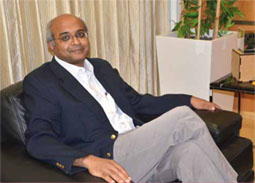An exclusive interview with Dr. V. Sumantran, Executive Vice Chairman, Hinduja Automotive

Though there is widespread concern over industrial slowdown hitting all the industries, the auto sector, for one, has its special scope to bounce back with redoubled vigour. This is more than evident in the growing freight movement with its closer link to GDP. A possible 6 to 6.5 per cent growth in GDP and the recent portfolio changes in the Union Ministry are pointer to rapid economic growth with greater employment opportunities, more per capita buying power, etc. The overall scenario would change for the better and the Indian economy will be restored to health sooner than later.
This optimistic view came from none other than Dr. V. Sumantran, Executive Vice Chairman, Hinduja Automotive, and also the Vice Chairman of Ashok Leyland, while reacting to the fast-changing developments since last few months which have adversely affected the economy.
In an exclusive interview to the MOTORINDIA Editor & Publisher, R. Natarajan, Dr. Sumantran, an automobile expert himself, referred to various key initiatives taken by Hinduja Automotive and pointed out that though there is an overall drop in medium and heavy commercial vehicles, sales of Ashok Leyland’s first ever LCV, the DOST, reflected an upward trend. In fact, DOST, which is considered his pet project, has proved a runaway success within few months of its launch. Interestingly, DOST has emerged the most popular and leading brand in six out of the eight states where the product was rolled out. Currently, the vehicle has a waiting period of three months, as the company ramps up production capacity to meet the growing demand.
On the issue of product diversification, Dr. Sumantran said the company foray into the Defence vehicle segment with the Stallion model has not only been a welcome expansion for Ashok Leyland, but also made the company emerge the second most successful nameplate holder after Hammer. Today, there are as many as 70,000 Stallion vehicles in the Indian Army alone, apart from a few vehicles supplied to the United Nations and Thailand.
Further, according to him, the Hinduja Group has also gone in for vertical expansion as in the case of Hinduja Foundries by setting up a state-of-the-art plant at Sriperumbudur, introduction of indigenously developed Neptune series engines, expansion of transmission products manufacturing at its Bhandara plant, as well as establishing high pressure aluminium castings through Alteams. Similarly, in order to expand its global footprint, the company had acquired Avia in the Czech Republic and recently bought out majority stake of 76 per cent in Optare in the UK.
Later on, the company felt the need for its own LCV platform and decided to establish a joint venture with Nissan of Japan. The JV’s first LCV product has not only been successfully conceived with its indigenous design, higher payload capacity and better fuel economy, but has also been very well positioned to meet the requirements of the Indian market conditions. The success of DOST is mainly due to the company’s highly skilled engineers who had developed the product three and a half years ago with strong support from the Nissan management team.
Started with just 23 engineers for the development of DOST, today the company has 450 engineers extending their all-round support for the product in India. As for the sales strategy of DOST, Ashok Leyland had identified an entirely different customer approach that offers a car-buyer experience to an LCV customer. For instance, it has set up a separate call centre facility through which the DOST customer would receive a call on the third as well as the 30th day of purchase of the vehicle, which is a first of its kind in the commercial vehicle segment.
Moving on, with an impending massive expansion in the country’s construction and mining segment, Ashok Leyland had decided to foray into the segment by establishing a joint venture with John Deere of USA. Following the good response to the Leyland Deere backhoe loader, the company is now working on a wheel loader as its next product.
Outlining the long-term prospects for the Hinduja Group business activities, Dr. Sumantran referred to the group’s entry into three major critical areas – electronics, environmental technology and IT data linkage. For electronics, it has a tie-up with Continental of Germany; for environmental technology it has established Albonair in Germany; and Defiance Electronics has been set up to meet the requirements of IT and data linkages. All the three companies now meet different requirements of the fast-growing Indian auto sector.
Stressing the need for cost control, he cited the economically priced, fully integrated and sophisticated environmental system currently made by Albonair. The company has already obtained a few patents for its innovative product and has also has bagged major contracts from a leading commercial vehicle manufacturer and an off-highway vehicle manufacturer in Europe.
Apart from providing CAD/CAM design development, Defiance provides an array of solutions to customers such as Telematics, Analytics, Bluetooth, etc. The company also does market research for Nissan at the global level through its Social Media Analytical Centre which is basically used for tracking customer opinions at various levels, and has become a rich source of instant feedback.
In conclusion, Dr. Sumantran observed that, with increasing competition in the commercial vehicle segment in the country, acceleration in technology growth and product maturity as well as a well-designed delivery system, it will be the end customers who would benefit from the growing competition, as they would have much better quality products on offer, which would certainly be a customer delight.